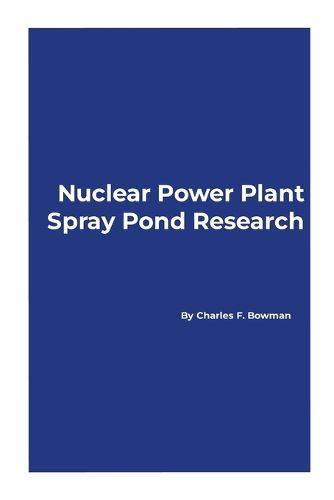Readings Newsletter
Become a Readings Member to make your shopping experience even easier.
Sign in or sign up for free!
You’re not far away from qualifying for FREE standard shipping within Australia
You’ve qualified for FREE standard shipping within Australia
The cart is loading…






This title is printed to order. This book may have been self-published. If so, we cannot guarantee the quality of the content. In the main most books will have gone through the editing process however some may not. We therefore suggest that you be aware of this before ordering this book. If in doubt check either the author or publisher’s details as we are unable to accept any returns unless they are faulty. Please contact us if you have any questions.
A spray pond is a system of pipes and spray nozzles that spray water into the air to cool the water. They are similar in this way to cooling towers in that they dissipate waste heat to the atmosphere principally through evaporation. Spray ponds offer significant advantages over mechanical draft cooling towers for waste heat rejection including superior simplicity and operability, lower preferred power requirements, and lower capital and maintenance costs. Several nuclear power plants constructed in the 1970's employ spray ponds as the plants' ultimate heat sink to dissipate the waste heat generated by the nuclear reactors during normal and accident conditions. For these plants to be licensed by the Nuclear Regulatory Commission, tests were conducted to demonstrate the ability of the spray ponds to dissipate the required heat under extreme environmental conditions. Since design basis accident conditions for the plants did not exist during these tests, analytical models were developed to predict the operation of the plants under these extreme conditions. The purpose of this book is to summarize the results of this research including field and laboratory tests and empirical and analytical predictive models.
$9.00 standard shipping within Australia
FREE standard shipping within Australia for orders over $100.00
Express & International shipping calculated at checkout
This title is printed to order. This book may have been self-published. If so, we cannot guarantee the quality of the content. In the main most books will have gone through the editing process however some may not. We therefore suggest that you be aware of this before ordering this book. If in doubt check either the author or publisher’s details as we are unable to accept any returns unless they are faulty. Please contact us if you have any questions.
A spray pond is a system of pipes and spray nozzles that spray water into the air to cool the water. They are similar in this way to cooling towers in that they dissipate waste heat to the atmosphere principally through evaporation. Spray ponds offer significant advantages over mechanical draft cooling towers for waste heat rejection including superior simplicity and operability, lower preferred power requirements, and lower capital and maintenance costs. Several nuclear power plants constructed in the 1970's employ spray ponds as the plants' ultimate heat sink to dissipate the waste heat generated by the nuclear reactors during normal and accident conditions. For these plants to be licensed by the Nuclear Regulatory Commission, tests were conducted to demonstrate the ability of the spray ponds to dissipate the required heat under extreme environmental conditions. Since design basis accident conditions for the plants did not exist during these tests, analytical models were developed to predict the operation of the plants under these extreme conditions. The purpose of this book is to summarize the results of this research including field and laboratory tests and empirical and analytical predictive models.